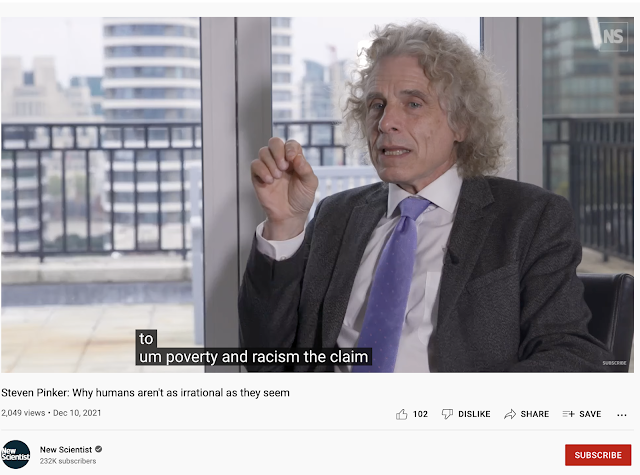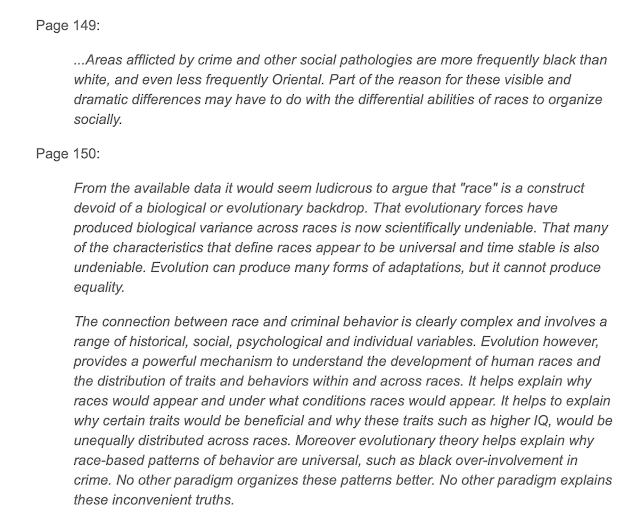During a mercifully brief interview with Graham Lawton of New Scientist, Steven Pinker, the world's most annoying man, compared the belief that crime is caused by poverty and racism to climate change denial.
...scientists are often surprised that there is so much denial... and it is sometimes attributed to scientific uh ignorance or scientific illiteracy... as it turns out itself a uh less than rational belief because it's not based on empirical studies of why people deny climate change... and what those studies show is that the deniers are actually no more ignorant of science than the believers, in fact a lot of people who endorse the scientific consensus are really uh out to lunch when it comes to the science of climate change, they think it has something to do with the ozone hole and toxic waste dumps plastic straws in the ocean.What does predict people's belief in climate change is just their politics the farther you are to the right the more denial there is.Now that's a case in which the scientifically respectable conclusion is aligned with the left but there are also cases that go the other way, where it's the the uh the left that's out of touch with the scientific facts.
The left was uh completely out to lunch when it came to... the um causes of crime, badly badly wrong when it uh - it still does... when it attributes crime to um poverty and racism...
But since the media almost always treats Pinker's utterances as unquestionable pearls of scientific wisdom, Lawton did not ask Pinker what he thinks is the true cause of crime.
I looked around for other instances of Pinker discussing crime, and found a Pinker interview from May with his fellow Quillette author Coleman Hughes. While Hughes is a Black American, he is also an apologist for race pseudoscience and a Koch employee, via the Koch-funded City Journal, and I wondered if Pinker was going to go all-in on a race pseudoscience explanation for crime.
Instead what I found was Pinker said something different about racism and crime:
HUGHES...But I want to ask now a deep and basic question relating to human nature and a kind of fundamental disagreement on what human nature is and how that relates to violence. And and the question, which is deceptively simple, is: "What is the cause of crime? What causes people to commit crime? Does the question make sense? If so, why or why not?" And just how do you view that--because and the context is, most people I talk to about this issue take it for granted that crime is, you know, we know the causes of crime--poverty, inequality, systemic bias, hopelessness, despair. And I have no doubt that that is true in some cases, but I - I - I've been persuaded by by by many arguments that sort of hold that human nature can can kind of just tend towards this to begin with.So, where do you stand on that? And how do you, how do you think of that?
PINKERYeah, there are ah, there different kinds of crime and there are different people who commit them out of different motives. Generally, it's certainly true that a lot of crime occurs in poor neighborhoods. And poor people are more likely to commit violent crime. It's not true, necessarily true of violence in general, especially through history when it used to be the aristocrats that had their armed retinues and would engage in contests of honor and revenge, dueling men men of honor as in the opening scene of Romeo and Juliet when two aristocratic families have a a street fight.So it's, that's not a given, but it tends to be true now. In general it's--although there are many causes of crime--they're not all racism and inequality, the ah especially not when it comes to changes over time.
So apparently Pinker does think that racism and poverty are causes of crime, just not the only ones.
It would appear that in May 2021, Steven Pinker did not believe "leftists" were incorrect to the point of climate-change-denial-incorrectness. But in December 2021 he did.
Did Steven Pinker change his mind between the May and December? Or is this yet one more example of weak and strong pinkerism?
Did Pinker change his response based on his audience, the way Pinker's buddy Razib Khan did on the issue of "white supremacy"?
Pinker's interview with Hughes demonstrates Pinker's utter obtuseness - it must be based on his own political leanings - when it comes to data:
PINKER
...The great American crime decline, which began in 1992, which saw rates of violent crime plunge to half their levels in you know, in New York it plunged 75 percent. This was during a period of rising inequality. And even though there've been there was a slight deep systemic decrease in racism--not enough to have brought crime rates down that quickly, 50 percent in eight years...
We saw in "Better Angels" that Pinker attributed Black American high crime rates to low Black marriage rates. In spite of the data showing the opposite - marriage rates fell along with crime rates.
Pinker doesn't say what metric he is using to determine "inequality" here. But we do have one useful metric, which involves looking at data, so maybe that explains why Pinker missed it:
And Black unemployment rates, while historically higher than white unemployment, also fell at the same time.
Seriously, what is wrong with Steven Pinker? Is he incapable of the tiniest effort to find data?
I'm not the first to be baffled by Steven Pinker. Way back nineteen years now, Louis Menand wrote the perfect Pinker review and said:
...Having it both ways is an irritating feature of "The Blank Slate." Pinker can write, in refutation of the scarecrow theory of violent behavior, "The sad fact is that despite the repeated assurances that 'we know the conditions that breed violence,' we barely have a clue," and then, a few pages later, "It is not surprising, then, that when African American teenagers are taken out of underclass neighborhoods they are no more violent or delinquent than white teenagers." Well, that should give us one clue...
The paragraph captures the "having it both ways" phenomenon seen repeatedly in Pinker's public opinions.
In the Hughes interview, right after Pinker claimed, without evidence, that inequality rose after 1992, he said this:
And even though there've been there was a slight deep systemic decrease in racism--not enough to have brought crime rates down that quickly, 50 percent in eight years--a lot of crime is opportunistic. People, there's a strong correlation between people who commit crime and lack of self-control.
Now "self-control" is a favorite subject of the biosocial criminologists, and they believe Black people possess less of it. As the reliably blunt rightwing biosocial criminologist John Paul Wright wrote:
While self-control is an important executive function, so, too, is intelligence. Indeed, there is no other individual variable as studied as intelligence. While hotly debated, thousands of studies of millions of individual intelligence scores indicate that IQ follows traditional racial categories (Rushton & Jenson, 2005). Asians have an average IQ of 106, Caucasians 100, and Blacks 85 (Lynn, 2006; Sarich & Miele, 2004)…
...Self-control and IQ covary, so that individuals with low self-control are also more likely to have low IQ. These deficits are potent enough to predict many of the negative life-course factors that afflicted individuals will experience. Longitudinal analyses of cohorts of individuals demonstrate that these individuals will face multiple problems across their life- course and that their self-limiting choices will show a high degree of continuity. Most will fail at their education and will then encounter problems in employment… They likely will live a fluid existence, relocating from place to place but often within the same economic stratum (Wright & decker, 1997). Finally their relationships will frequently be marred by conflict, unfaithfulness and unreliability. This pattern holds for anyone with deficits in executive control functions, black, white or Asian, but due to the distribution of low IQ and low self- control found in black populations, it is more often reflected in the lives of blacks.
And
Those passages were published in "Biosocial Criminology: New Directions in Theory and Research" edited by Anthony Walsh and Kevin Beaver.



